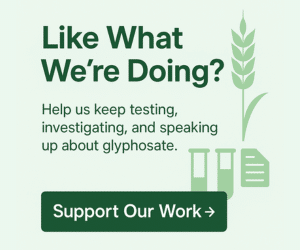HomeEnvironmental Impact
Environmental Impact
Over 30 Tonnes of Glyphosate on Auckland Roadsides and Parks: Is Our Stormwater Carrying a Toxic Load?
Auckland Council contractors used over 20 tonnes of glyphosate in 2024 — much of it sprayed straight into roadside gutters that drain to the sea. Our article investigates the hidden risks.
The Yield Myth: How Glyphosate May Be Undermining Crop Productivity
We were promised bigger harvests and better efficiency. But are glyphosate-based GM crops actually yielding less? Some scientists say yes — and the numbers back it up.
Long-Term Effects of Roundup on Soil: Hidden Impacts Revealed
What happens to soil after years of Roundup use? From microbes to minerals, we explore how glyphosate leaves a lasting—and often overlooked—legacy underground.
When the Spray Stops Working: New Zealand’s Growing Weed Resistance Problem
As glyphosate resistance spreads globally, early signs are emerging here in New Zealand. If our most relied-on weedkiller stops working—what's the plan?
Why Did Auckland Abandon Safer Weed Control? North Shore’s Forgotten Success Story
North Shore City kept streets weed-free for over 20 years without glyphosate. But then came the Super City—and the chemicals came back. Why?
Glyphosate Is Messing with Bee Brains — And It Doesn’t Take Much
A new study reveals that even brief contact with glyphosate can change gene expression in bees' brains. What does that mean for pollinators—and for us?
What Lies Beneath: How Glyphosate Builds Up in Soil Over Time
Glyphosate doesn’t just wash away. It can linger in soil for months—sometimes years—building up over time and disrupting the microbial life that plants depend on. From farms to schoolyards, this invisible residue may be contaminating the very ground our food grows in—and our children play on.
The Hidden Cost of Spray Drift: Are We Protecting Our Communities?
Glyphosate is often sprayed with precision — but it doesn’t always stay where it’s sprayed. This article explores the overlooked risk of spray drift, and how it may be exposing our communities, ecosystems, and children to harm without consent or warning.
Glyphosate and Soil Health: What Are We Losing?
Glyphosate doesn’t just kill weeds — it can disrupt soil health, affecting microbes, earthworms, and long-term productivity. Are we risking our soil’s future?
Glyphosate Alternatives for Home Gardeners: Safer Weed Control Options in NZ
Many Kiwi gardeners still rely on glyphosate out of habit, but safer options exist. From natural weed control methods to glyphosate-free weedkillers now available in New Zealand, here’s how to protect your garden without harming your soil, your health, or the environment.



